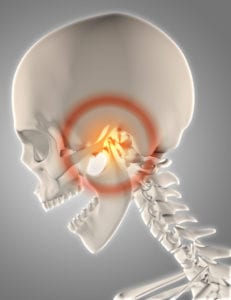Do you suffer from chronic headaches, unexplained earaches, jaw pain, or other facial pain? If so, you may be one of the millions of people suffering from Temporomandibular Joint Disorders (TMD). TMD is a complex group of problems sometimes referred to as TMJ disorders. Dr. Amy Marckese with Dental Spa offers TMJ treatment in Indianapolis, IN for those suffering from this painful disorder.
What is the Temporomandibular Joint (TMJ)?
The TMJ is a complex joint connecting the jawbone to the base of your skull. The joint is located in front of each ear. It comprises many components, including discs, ligaments, muscles, and bone. The TMJ allows you to move your mouth and perform various functions. This includes talking, chewing, yawning, or simply moving your jaw in any direction.
What are Temporomandibular Joint Disorders (TMD)?
A group of conditions that affect the TMJ and the muscles surrounding it is referred to as Temporomandibular Disorders (TMD). TMD can cause pain and discomfort in the jaw and surrounding areas. Many things can lead to TMD, and diagnosing it can be difficult.

What Causes TMJ?
TMJ problems can develop for many reasons, and identifying the cause is the first step toward finding relief. Understanding what leads to TMJ disorder can help you take steps to prevent or manage the condition.
Jaw Injury or Trauma
One of the most common causes of TMJ disorder is an injury to the jaw. A direct blow to the face, a fall, or a car accident can damage the joint, leading to pain and limited movement. Even if the injury doesn’t seem serious at first, it can cause long-term problems with the jaw joint, leading to TMJ disorder over time.
Teeth Grinding and Clenching
Many people grind or clench their teeth, often without realizing it. This habit, known as bruxism, puts excessive pressure on the jaw joint and can lead to TMJ disorder. Clenching your teeth during stressful situations or grinding them at night can wear down the joint and cause pain, stiffness, and even headaches. Wearing a night guard can help protect the jaw and reduce strain.
Arthritis in the Jaw Joint
Arthritis can affect the temporomandibular joint just like other joints in the body. Osteoarthritis, the most common form, occurs when the cartilage in the joint wears down over time, leading to pain and difficulty moving the jaw. Rheumatoid arthritis, an autoimmune condition, can also damage the joint and surrounding tissues, making TMJ disorder worse.
Jaw Misalignment
If the teeth or jaw are not properly aligned, it can put extra stress on the TMJ. A misaligned bite, or malocclusion, causes the jaw to work harder when chewing or speaking. Over time, this extra strain can lead to pain and dysfunction in the joint. Orthodontic treatment, such as braces or Invisalign, can help correct bite issues and reduce TMJ symptoms.
Stress and Muscle Tension
Stress can play a major role in TMJ disorder. When people feel stressed or anxious, they may tighten their jaw muscles, clench their teeth, or develop other habits that strain the TMJ. Over time, this constant tension can lead to pain and stiffness in the jaw. Practicing stress management techniques, such as meditation, deep breathing, or massage, can help relax the jaw muscles and prevent TMJ pain.
Poor Posture
Posture affects more than just the spine—it can also impact the jaw joint. Sitting with the head pushed forward, often due to looking at a phone or computer screen for long periods, can put strain on the muscles in the neck and jaw. Over time, this strain can lead to TMJ disorder. Maintaining good posture, taking breaks from screens, and strengthening neck muscles can help reduce jaw tension.
Dental Problems and Missing Teeth
Dental issues, such as missing teeth or poorly fitting dentures, can cause the jaw to work harder when chewing. This extra strain on the TMJ can lead to pain and dysfunction. Replacing missing teeth with dental implants or bridges and ensuring dentures fit properly can help prevent TMJ problems.
Hormonal Factors
Research suggests that hormones may play a role in TMJ disorder, especially in women. TMJ issues are more common in women than in men, particularly during childbearing years. Estrogen may affect the jaw joint and surrounding tissues, making some women more prone to developing TMJ problems. More research is needed to fully understand this connection, but hormonal changes could be a contributing factor.
Bad Chewing Habits
Certain habits, like chewing gum frequently or biting on hard objects, can overwork the jaw joint. Chewing gum for long periods keeps the jaw in constant motion, which can strain the muscles and lead to TMJ symptoms. Similarly, biting nails, chewing ice, or using teeth to open packages can stress the joint unnecessarily. Avoiding these habits can help protect the TMJ from excessive wear and tear.
Our Patients Say It Best
I dreaded going to the dentist before I found dentalSpa. Not only that, but Dr. Marckese-Braun diagnosed a bite problem that has put a stop to chronic migraines I have had and been medicated for forever. I highly recommend her. Not only can you feel like you’re in a spa, but also get the best dental work around!
–Jolene C, Zionsville, IN
Common TMJ Symptoms
TMJ pain and symptoms can decrease a patient’s quality of life and cause suffering. The symptoms of TMJ can vary greatly between patients. TMJ symptoms often mask themselves or are similar to those of other medical conditions, making diagnosis extremely difficult. You need to seek care if you have any of these symptoms, especially if they are persistent.
Common symptoms of TMJ disorder include:
- Headaches, especially upon waking
- Jaw pain
- Shoulder, neck, facial pain
- Clicking or popping when opening or closing the jaw
- Locked jaw or limited mobility in the jaw joint
- Teeth clenching and teeth grinding, often accompanied by tooth wear
- Chronic earaches
TMJ Treatment in Indianapolis, IN
If you are diagnosed with TMJ disorder, Dr. Amy Marckese offers TMJ treatment in Indianapolis, IN. She will take a digital scan and create a customized oral appliance specifically designed for you to help alleviate your symptoms. This appliance is 3D printed in her office, resulting in a 2-3 day turnaround time versus two weeks when sent to a lab. Our patients also routinely tell us how much more comfortable these 3D-printed appliances are than those previously made in a lab.
An oral appliance is a removable device that helps keep the teeth and jaw in the proper position during sleep and prevents teeth from grinding or clenching. Prolonged teeth grinding or clenching can lead to tooth wear and contribute to tooth decay and gum disease.
Botox injected directly into the masseter muscle can also alleviate TMJ pain and other clenching/grinding symptoms. Botox works by “freezing” the muscle where it is injected. This causes the muscle to relax, alleviating the tension along the jawline.
This, in turn, reduces soreness, tension headaches, lockjaw, and overall pain. The other advantage of Botox for TMJ is that it works all the time, whereas an appliance is often worn only at night. Please note you can still chew normally after masseter muscle Botox because many muscles act together to move the jaw.
The combination of Botox in the masseters with the use of a custom-made appliance gives patients amazing results. Botox injected into the masseter muscle can also slim the jawline as the masseter muscle “shrinks” with Botox.
Dr. Marckese also provides a range of restorative dentistry treatments to repair teeth damaged due to TMJ dysfunction. Restorative treatments may include:
TMJ Disorder FAQs
If you would like to learn more about TMD and TMJ treatment, please read through our frequently asked question section. Dr. Amy Marckese is a caring dentist who wants her patients to feel confident about the care they receive for their condition. If you have further questions, please contact our office during regular business hours.
What is the main cause of TMJ?
While doctors are not entirely sure what the root cause of TMJ is, they do know certain factors can contribute to its severity. Misalignment or injury to your teeth or jaw, teeth grinding, arthritis, and stress are all contributing factors, and they may lead to muscle tightness in the jaw and overall discomfort related to the syndrome.
What will happen if I don’t treat TMJ?
If left untreated, TMJ is likely to worsen and become more severe over time. The longer it goes untreated, treating TMJ will also be more difficult for your provider. Symptoms may worsen, such as chronic and debilitating headaches or dental degradation. To prevent this, it is important to seek care early.
How do dentists treat TMJ?
Multiple treatment options are available, depending on the severity of your condition. In mild cases, treatment may include medicine or oral therapies to help strengthen and stretch your jaw muscles. If your case is more severe, you have multiple surgery options. If you are recommended surgery, be sure to discuss the potential benefits and risks of your procedure to determine what is right for you.
How long does it take to heal after TMJ surgery?
Recovery time from TMJ surgery can vary depending on the surgery performed. Most options are outpatient procedures, meaning you will be home on the same day. You may need multiple days of rest following your procedure for a full recovery, so consult your dentist for your recovery plan.
What vitamin deficiency causes teeth grinding?
Vitamin D deficiency can cause teeth grinding. If a patient is deficient in vitamin D, they may be associated with a higher potential to grind their teeth. Dentists link this vitamin deficiency to increased stress levels, usually the main cause of teeth grinding.
What is myofascial pain?
Myofascial pain is a common type of TMD. It essentially involves patients experiencing discomfort or pain in the muscles that control jaw movement, as well as in the neck and shoulders. Myofascial pain results from muscle tension, teeth clenching, teeth grinding, and other stress-related tension factors.
Schedule a Dental Exam & Consultation for TMJ Treatment in Indianapolis, IN
TMJ therapy can dramatically improve your quality of life. If you think you may have TMJ dysfunction, call our Indianapolis dental office near you at 866-486-0230 or schedule an appointment with your restorative dentist in Indianapolis, IN, today.
